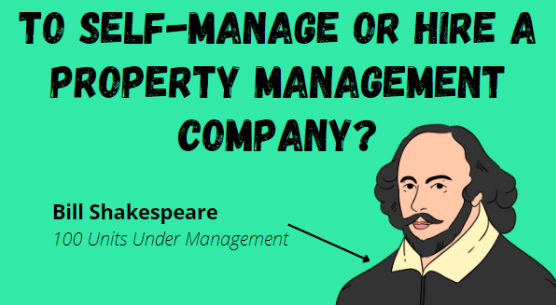Below, we dive into an age old question for real estate investors: who should manage my properties?
Perhaps the most important part of any real estate investment is how you operate the asset. That’s right: neither the acquisition nor the structure of ownership nor even the market where the property is located matters as much as how you run the property (although all of those aforementioned factors do matter). Property Management (PM) is where the rubber meets the road in terms of real estate investing. It’s where you show up to your tenants and how you justify them paying you rent every month. Let’s dive into some of the myriad responsibilities of a multifamily PM:
- Setting and Collecting Rent: Property managers should know local market rental rates and ensure timely rent collection.
- Renovation Budget and Timeline: Understanding renovation needs and budgeting accordingly to enhance property value.
- Staying on Top of Maintenance Issues: Regular inspections and maintenance tracking to address critical issues.
- Legal Concerns: Knowledge of tenant and landlord laws to streamline operations and avoid legal issues.
- Quotes/Bids: Access to local contractors & vendors for cost-effective repairs and services.
- Tenant Management: Tenant screening, communication, and negotiation.
- Bookkeeping and Records: Maintaining financial transparency and tracking expenses.
- Marketing: Effective marketing strategies to fill vacancies with qualified tenants.
- Finding Opportunities to Add Value: Identifying ways to enhance property value and tenant satisfaction.
- And Much, Much More…
Now that we understand what a PM does, let’s tackle the question at hand: to self-manage or hire a third party PM company? The decision to self-manage or to go third party with a professional PM comes with a number of considerations unique to each investor and property, and there is by no means a one-size-fits-all solution. Below are some of the Pros and Cons of each approach.
Benefits of Self-managing:
- Control – As good as some third-party PM’s are, no one will ever care for your property like you as the owner will. By being more involved, you can ensure that your property is properly maintained and that your tenants are kept happy.
- Education – The best way to learn how to operate these assets is to self-manage. Managing a property means you’ll have to build all of the essential skills and know-how of a property manager, from landlord laws to vendor management to tenant screening and more.
- Service – By getting your hands dirty in self-managing, you’ll likely be dealing with tenants directly. As a result, you’ll learn how to handle tenants issues better and ultimately be able to offer them better service.
- Savings – Self-managing is far more cost-efficient. Property Management companies typically charge 8%-12% (plus expenses) whereas self-management will likely cost a fraction of that. Keep in mind that this doesn’t consider the value of your time that would be devoted to overseeing your in-house PM operations.
Drawbacks of Self-managing:
- Time Investment – You’ll need to dedicate significant time to managing your properties. You’ll have tons of responsibilities from scheduling maintenance to screening tenants to collections to bookkeeping and much, much more. This can be a full-time job depending on the number of properties and tenant class you’re dealing with.
- Distraction From Acquisitions – All of the time spent managing your properties is then time you won’t have to be able to identify and offer on new acquisitions, a key to building a thriving multifamily portfolio.
- Learning Curve – By stepping in as your own PM, you’re basically letting a novice run your business. As opposed to an established third-party PM, you will likely start off without any systems, industry experience, in-place team, landlord-tenant legal expertise, nor local vendors. You’ll be expected to learn all of this on the job!
- Location – It is difficult, if not impossible, to manage a property effectively if it’s located far from where you live.
- 24/7 Availability – Property management is a job that’s never off the clock. You may get a call in the middle of the night about any number of tenant issues/emergencies and may have to respond urgently.
It’s for these reasons that we only partner with third party, professional Property Management companies. While we pay them a management fee for their service, a quality PM’s expertise and systems will often result in properties being more profitable than they would be if we self-managed even with the fee incorporated. Translation: we perform better financially and have more time to focus on higher level duties like Asset Management (see video HERE for a rundown of this important discipline).
To summarize the above, it’s evident that the self-managed vs. outsourced Property Management choice depends on a number of factors, with self-management offering more involvement and control but also requiring a significant time investment. On the other hand, hiring competent third-party Property Management provides expertise and also a better ROT (Return On Time), something we as investors are always looking to maximize. For more on what questions to ask a PM that you’re vetting, please reach out.

